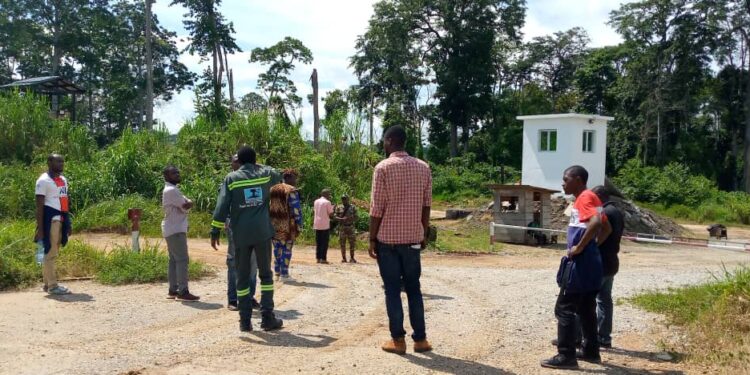The purpose of any Hydro Power Project is to boost the economy of the country and better the lives of those living in the local communities where the project is planted as well as protect their environment. But in Cameroon, most if not all of such projects have rather become a challenge to the local communities.
“What I can tell you in simple terms is that we don’t feel the presence of the project in our community, as it was sold to us some years back, we are fast loosing our lands and the project is giving us no services, our children are not employed there and the few lucky ones are taken as labourers irrespective of their educational background.” Bikele Ambomo Bruno, Chief of Olembe-Batchenga, cried out to our reporters inside his gradually degrading cocoa farm.
Olembe-Batchenga is one of the villages in the Batchenga Subdivision where the Nachtigal Hydro Power Company (NHPC) is constructing a dam.
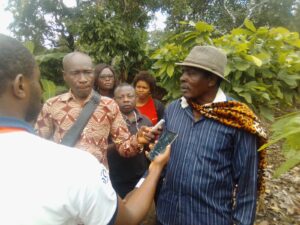
It is same cry across all the villages in Batchenga where the project is planted.
“All is not black, but i strongly decry the fact that the men in my village who were happily into fishing and sand mining, and their wives who were committed in related economic activities today are all on their knees begging to survive as their businesses have been swallowed by the dam construction project.” Joseph Ahanda, Chief of Ndji Village in Batchenga Subdivision told News Upfront.
The construction of the Nachtigal Hydro Electricity Dam according to the locals has rather come to add more pains to their wounds and the impact is visible.
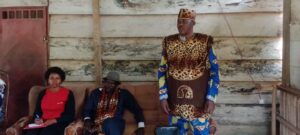
The project was launched in 2018 by the Nachtigal Hydro Power Company (NHPC) which was created on July 7, 2016. The 2KM long roller compacted concrete (RCC) dam with a height of 14m will generate 420MW upon completion.
Just like any other project, feasibility studies were made before the launching of the projects, and various plans were elaborated between the company (NHPC) and the the affected communities, though the communities and socio professional corps impacted estimate that the consultations were not participatory.
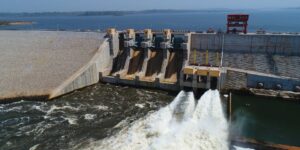
But according to a collective of Civil society Organisations under the banner of “IFI Synergy Group” speaheaded by Green Development Advocate (GDA), the major problem is the non respect of the different socio-environmental norms and collaboration documents.
One of the norms (safeguards) set aside by the world bank in each of their sponsored projects is on the commitment of the various stakeholders involved in the project; ie all the details about the project (deadlines, activities, obligations, responsibilities, procedures, modalities, collaboration…) should be communicated to them on time and in a simplified language understood by all.
“Some of the chiefs of Batchenga have complained that they were completely sidelined from the consultation process, while the population are complaining that communication surrounding the project was not properly done, coupled with the big problem of compensation which actually is being done in disregard of the norms set aside by the World Bank (WB) and African Development Bank (AfDB), sponsoring the project.” Madam Kameni Nelly Project Manager at IFI Synergy Group, who has worked with the community for months told News Upfront during a training seminar organised by IFI Synergy Group to school journalists on the laid down social and environmental norms of the WB and AfDB, relative to the construction of Hydro Power projects.
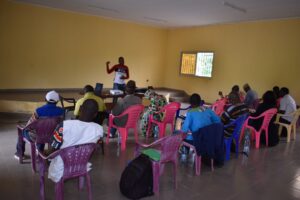
Olinga Pierre, from the fishermen’s association of Nkol-Ndji Village, corroborated the point presented by Nelly saying;
“We were actually not considered when the feasibility studies were being carried out, the company said fishing was not a permanent job whereas it was our only source of livelihood, it was thanks to the advocacy from IFI Synergy Group that our plights were heard, and again our sector was subdivided into three (Red, Blue and Green zones) but we don’t really master the difference.” He said, adding that;
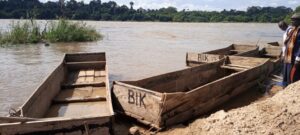
“When they divided the sector, they said we could continue to fish in the green zones, but we are facing enormous challenges having access into such zones given that security forces stationed by NHPC would prevent us with pretext that it’s a no go area.”
“There are 10 safeguards set aside by the World Bank for project implementation, all to ensure that the rights, tradition, culture and plights of the host communities should be respected and for the smooth running of the project.” Says Ekane Nkwelle, Coordinator at IFI Synergy Group.
On August 25, 2021, during our visit to Olembe and Ndji villages, the traditional rulers took us to their sandpits, but the journey was not that easy, as we came across Cameroon soldiers guarding one of the entrances to the Project site.
Though we were not entering the site but rather passing besides it, the soldiers prevented us from acceding the sandmine for reasons that of late, insecurity has been a challenge in the vicinity. This to the dismay of the traditional rulers of Ndji, Joseph Ahanda, who is virtually impaired.
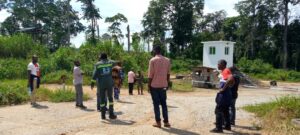
“You can confirm for yourself what the fishermen are saying, you see how I, Chief of Ndji, am prevented from moving around freely in my village, this just confirms that the project owners don’t want to collaborate with us in any way. I fear for my crops in the farm which I am to harvest in the days ahead, they may get bad if this situation persists.” Joseph Ahanda lamented almost in tears, but was consoled by his colleague from Olembe.
All attempts by News Upfront to reach the management of the Nachtigal Hydro Power Company (NHPC) were to no avail.
IFI Synergy Group disclosed that most important communication documents were hidden from the locals and even on the website of NHPC they were published years after the start of the project.
Besides Communication and consultation challenges, IFI Synergy Group says the project failed to respect most of the socio-environmental norms of the WB, and has led to severe health challenges in the different localities.
“About 80% of my people are suffering from Onchocerciasis since the start of the project, and they risk dying all in the next ten (10) years of nothing is done to compensate us and remedy the situation.” Chief Ombouma, traditional ruler of Nachtigal village cried.
“When we talked with those whose land have been used in the project, we understood that some have been partially compensated but the compensation did not respect the standards of the Financial institution. Those who do not have a land title were not compensated in most cases which is against the safeguards of the World Bank which stipulates that evaluation of their sponsored projects follows their norms and not that of nations, and everyone who is affected in a project of this nature must be compensated irrespective of whether they have a land title or not.” Aristide CHOCGAM of Green Development Advocate, member of IFI Synergy Group told journalists during the workshop organised by IFI Synergy Group in Batchenga.
A reasonable portion of lands in most of the villages in Batchenga where the project is planted has been swallowed by the project, and the compensation they are receiving do not reflect the promises they were made.
“Before now, I used to make a profit of FCFA 16700 per day and FCFA 500.000 per month from my fishing activity, but today they are proposing less than FCFA 500.000 for us to quit our business site.” EYEBE Jean Wilfried, a fisherman in Ndji lamented.
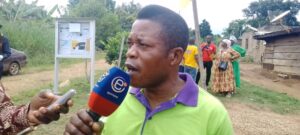
Unlike fishers, Sand miners still do not feel they have been considered enough, as they face other challenges like non recognition of some of their sites and underestimation of their products.
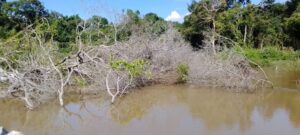
The compensation exercise according to the WB standards needs to respect the mode of life of local communities, and preserve the cultural patrimony of the indigenous population.
“That is not what is happening here, I was happily living in an island in Ndji Village where I carried out spiritual healings thanks to the river that served as home for my gods. I had a good life, but see where I live today, in town, no where to host the gods. The gods are angry and my healings are gradually becoming inefficient, I pity my patients.” Mama Nyassa, a tradi-practitioner who was relocated in Ndji told us.
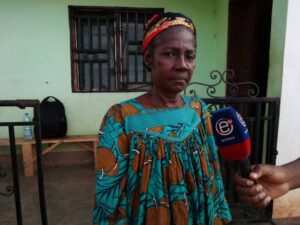
Another relocated victim, Lemono Biloa, is surprised that he was removed from along the earmarked energy transportation line, but still relocated along the same line in a different location, and not without consequences.
“I was happily living in my compound on a surface area of 902m2, but the took me and gave me a site of 400m2 and constructed a house there for me, I don’t even have space to relax outside, all my fruits I used to grow, I can’t anymore, my only problem now is the rest of my 502m2 am asking from NHPC.” He said.
The construction of the Nachtigal Hydro Power Dam is feared could generate and release more than the estimated quantity of dangerous gases to the environment, and this to the IFI Synergy Group is due to insufficient consideration of climate aspect by the project management.
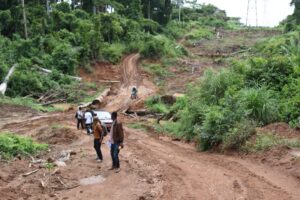
“The estimate by NHPC of CO2 emissions is 188.800tCO2/year, but following our studies, we found out that there is a big gab ignored since our findings show that the company will generate 559.682.31tCO2/year. The problem was partly because the company used very outdated data in their studies, they did not respect all the regulatory frameworks and decrees relative, and they ignored the consequences of the dam on the environment upon completion.” Says Njal Njock Simon, a senior forestry technician and independent consultant who works for Action for Sustainable Environment (ASE), and member of the platform IFI Synergy Group.
The Construction rate of the Nachtigal Dam according to some officials of the company is close to 80% and as the project draws near completion, the population are sceptical on how the way forward would look like given that close to a year after the construction of the Lom Pangar Hydro Power Dam, the surrounding population continue to feel serious negative effects generated by the project.
As designed, the Lom Pangar Dam has significant environmental and social impacts, flooding over 30,000 hectares of tropical hardwood forest, threatening the Deng Deng reserve and its biodiversity, and submerging a portion of the Chad-Cameroon oil pipeline.
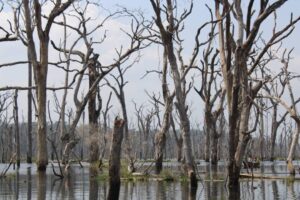
There is continuos water rise consuming villages while in other areas, wild animals now stroll freely into the villages and live with humans causing havoc especially among children and the elderly population, many of whom are reported dead following a report from SAILD in 2020.
Just to note that the communities in Batchenga made some recommendations on the way forward and one of the greatest recommendation they have been asking is to have a tripartite meeting with NHPC, IFI Synergy Group and the different communities impacted by the project to look for lasting solutions.
